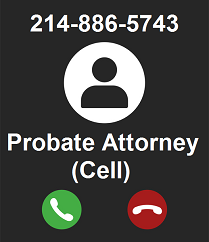Probate: 469.708.6050
Wills & Guardianship: 214.227.6400
13355 Noel Rd., Ste. 1100
Dallas, Texas 75240
Receive and Act on Creditors' Claims
The executor must act on all creditors’ claims that are submitted. Once a claim is submitted, the executor must either allow or reject the claim. In choosing whether to allow or reject the claim, the executor must decide whether the creditor submitted its claim in the correct manner. The executor must also determine if the claim is valid.
Dependent Administrators take note: the claims process in a dependent administration is a very technical process for both the personal representative and the creditor. You should immediately contact your probate attorney before acting on any claims in a dependent administration as action must be taken within 30 days of receiving a claim.
After the executor has received all of the claims of the estate, the executor must pay the allowed creditors’ claims in accordance with the priority established in the Texas Estates Code. That priority generally is as follows:
Class 1. Funeral expenses and expenses of last sickness for a reasonable amount to be approved by the court, not to exceed a total of $15,000.00, with any excess to be classified and paid as other unsecured claims.
Class 2. Expenses of administration and expenses incurred in the preservation, safekeeping, and management of the estate.
Class 3. Secured claims for money, including tax liens, so far as the same can be paid out of the proceeds of the property subject to such mortgage or other lien.
Class 4. Claims related to child support.
Class 5. Claims for taxes, penalties, and interest due.
Class 6. Claims for the cost of confinement.
Class 7. Claims for repayment of medical assistance payments made by the state to or for the benefit of the decedent.
Class 8. All other claims.
Receive Creditor's Claims - The manner in which a creditor must submit its claim depends upon the type of administration involved (independent vs. dependent administration), and whether or not the creditor received a notice pursuant to Section 308.054 of the Texas Estates Code.
Independent Administrations - The claims process in an independent administration depends on whether the creditor received notice pursuant to Section 308.054 of the Texas Estates Code.
Creditor received notice under Section 308.054 - The creditor must give notice to the independent executor of the nature and the amount of the claim in:
- a written instrument that is hand-delivered with proof of receipt or mailed by certified mail, return receipt requested, to the independent executor or the executor's attorney;
- a pleading filed in a lawsuit with respect to the claim; or
- a written instrument or pleading filed in the court in which the administration of the estate is pending.
Creditor did not receive notice under Section 308.054 - The creditor may give notice to the independent executor of the nature and the amount of the claim in any reasonable manner. The Texas Estates Code does not specify any particular requirements.
© 2016-2023 Duran Firm, PLLC
All rights reserved.













